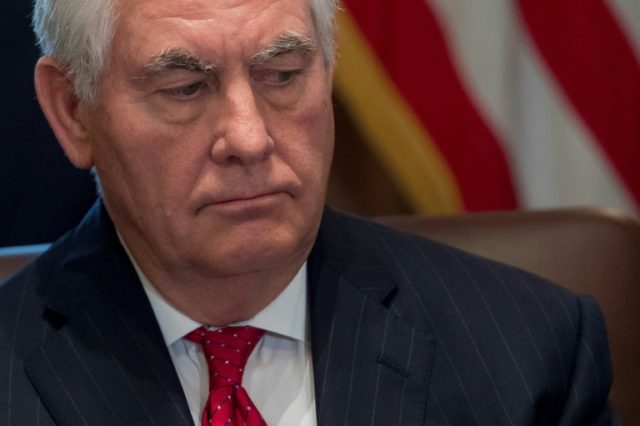The United States and Canada hosted a 20-nation gathering in Vancouver on Tuesday, leading to a consensus that even tougher sanctions could be applied against North Korea to make it give up on developing nuclear missiles.
U.S. Secretary of State Rex Tillerson said military options are still on the table if these sanctions fail.
Reuters notes that Tillerson initially declined to comment on possible military strikes against North Korea, but then said it was up to Pyongyang to avoid conflict by negotiating on its nuclear program.
“We all need to be very sober and clear-eyed about the current situation,” Tillerson said. “We have to recognize that the threat is growing and if North Korea does not choose the pathway of engagement, discussion, negotiation, then they themselves will trigger an option.”
“Our approach is, in terms of having North Korea chose the correct step, is to present them with what is the best option,” he added. “Talks are the best option; that when they look at the military situation, that’s not a good outcome for them.”
Keeping up pressure from the military option is a difficult dance for the Trump administration, which is taking pains to insist it wants diplomacy and views military strikes as a last resort, but also wants Pyongyang to believe it will not be allowed to run out the clock on nuclear missiles with the same diplomatic delaying tactics it has used since the Clinton administration.
Although the United States temporarily suspended joint exercises with South Korea until after the Winter Olympics, the Department of Defense let it be known that American troops from every service branch are quietly preparing for action on the Korean peninsula, after months of concern from defense officials that the U.S. might not be adequately staffed and trained for such a conflict. Six nuclear-capable B-52 strategic bombers have also been deployed to Guam, alongside B-2 stealth bombers and the B-1B bombers that have proven so vexing to North Korea.
The Vancouver meeting produced an agreement to fully implement existing U.S. sanctions against North Korea and consider “unilateral sanctions and further diplomatic actions that go beyond those required by U.N. Security Council resolutions.” These further measures were not described in detail. Secretary Tillerson’s remarks emphasized thwarting North Korea’s efforts to evade sanctions with illicit transfers of manufactured goods and oil.
The meeting notably was not attended by China and Russia, which would be key to making tougher sanctions work. Chinese Foreign Ministry spokesman Lu Kang cast doubt on further Chinese cooperation by accusing the United States of having a divisive “Cold War” mentality and insisted that “only through dialogue, addressing the reasonable concerns of all parties, can a way to an effective and peaceful resolution be found.”
Russian Foreign Minister Sergey Lavrov even more forcefully denounced the Vancouver meeting as “unacceptable” and “destructive.”
This might be interpreted as dismaying evidence North Korea’s Olympic “charm offensive,” as Japanese Foreign Minister Taro Kono called it, is working to fracture the international alliance along its most obvious line of stress. China and Russia are looking for excuses to ease up on North Korea.
China wants to go back to the “freeze-for-freeze” idea it has been pushing for years, in which the United States and South Korea agree to halt joint military exercises (which just happen to annoy China while infuriating North Korea) in exchange for North Korea agreeing to “freeze” its nuclear weapons program. This is most likely what Lu had in mind when he recommended dialogue that would address “the reasonable concerns of all parties.”
Secretary of State Tillerson explicitly rejected the freeze-for-freeze idea from Vancouver, denouncing it as an “approach in which legitimate military exercises are placed on the same level of equivalency as the DPRK’s unlawful actions.”
“It is not the time to ease pressure, or to reward North Korea,” the Japanese foreign minister insisted from Vancouver. “The fact that North Korea is engaging in dialogue could be interpreted as proof that the sanctions are working.”
Kono also explicitly warned that North Korea “wants to buy some time to continue their nuclear and missile programs.”
Tillerson, however, praised “our unity and common cause with others in the region, most particularly China and Russia,” and said that unity would remain despite “North Korea’s frequent attempts to divide us and sow dissension.”
South Korea indicated it remains firmly on board with the international coalition against North Korea despite the swift progress of talks over the Winter Olympics and assorted gestures of goodwill, such as Seoul agreeing to repatriate the bodies of four presumed North Koreans found dead in a capsized boat this month.

COMMENTS
Please let us know if you're having issues with commenting.